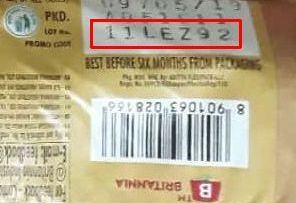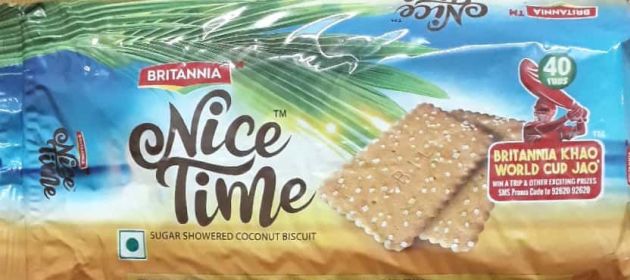Britannia recently ran a Customer Engagement Management campaign for its NICE biscuit.
Like any typical CEM campaign, the BRITANNIA KHAO WORLD CUP JAO campaign required consumers to find a promo code on the product package and SMS it to a telephone number (92620 92620).
But, from here on, the Britannia CEM campaign deviated significantly from the CEM playbook.
As you will see shortly, I don’t mean that as a compliment.
#1. WHITHER CODE?
It was very hard to find the code. (I chucked a couple of wrappers – and my chance to participate in the CEM program – when I couldn’t find the code.)
But that was only because I was searching for a scratch panel beneath which codes are hidden in all CEM programs.
 There was no scratch panel on any of the Britannia wrappers. The code was hidden in plain sight – it was printed along with batch number and MRP.
There was no scratch panel on any of the Britannia wrappers. The code was hidden in plain sight – it was printed along with batch number and MRP.
Very odd place for a code, indeed.
Because the code is visible to everyone, anyone can see it and SMS it. It would appear that there’s no need to buy the product to participate in the CEM program.
But that would be jumping to the wrong conclusion. What appears at first blush to be a bug is actually a feature upon deeper examination.
According to the fineprint in the SMS received from Britannia, participants have to “retain the empty wrappers for verification”. So purchase is required to participate in Britannia World Cup CEM.
Britannia is right in enforcing this cardinal principle of a CEM program but I felt the manner in which it did so was quite shady.
#2. CODE DOES NOT EXPIRE
I sent a code from my mobile phone. It was accepted. I got 40 runs.
My wife sent the same code from her mobile a few minutes later. That also got accepted. She also got 40 runs.
Puzzled by this, I resent the same code from my mobile. That also got accepted and my run tally went up to 80 runs.
That was very strange.
 With other CEM programs, we’d have received an error message saying the code was already used / expired – à la the Adiction Deo campaign I covered in Drive Engagement With Error Messages! (see exhibit on the left).
With other CEM programs, we’d have received an error message saying the code was already used / expired – à la the Adiction Deo campaign I covered in Drive Engagement With Error Messages! (see exhibit on the left).
With Britannia, there was no such warning.
———-
Midway through the campaign, I’ve already come across two serious anomalies.
Not sure how many more surprises we may get after the campaign ends.
I have no inside track into the Britannia World Cup CEM campaign but this is what I’d speculate about its shady nature.
EITHER
It’s a low budget campaign where all checks will be done manually and duplicate codes rejected later.
OR
It’s an outright scam where the unsuspecting public is fooled into sending more and more SMSs, thus increasing the revenues of TELCOs.
I’m inclined to believe it’s the latter since two months have elapsed since I SMSd my code three times and I still haven’t received any notification that my second and third submissions of the code have been rejected.
LOL. For good measure, they should insist that the text message should come from SWIFT HQ in Brussels to RBI HQ in Mumbai, thus enabling TELCOs to earn higher revenues of ISD SMS compared to National SMS!
— Ketharaman Swaminathan (@s_ketharaman) March 12, 2018
This is not the only campaign of Britannia.
I thought the biscuit manufacturer followed sharp practices by making misleading use of the term “jackpot” in its Britannia Morning Jackpot CEM campaign.
It’s not only me. Its competitors and customers have been panning Britannia lately for similar behavior.
According to a recent article in the Economic Times entitled Amul, Britannia indulge in bitter battle over butter, the Managing Director of Britannia’s competitor Amul said:
Britannia’s was a misleading claim. “If vegetable oil is as healthy as they claim, then why do they call their biscuit ‘Butter Cookie’ on the packet. Why not refer to them as palm oil cookie?
This was echoed on Twitter:
Cholesterol from butter has no negative impact on health but these guys are perpetuating the same myth.
Either they haven't read up enough or know it but still chose to go with the narrative of "cholesterol is bad for you."
Dishonest marketing either way.
— Mustafa (@ghuubear) August 16, 2019
The modern world has cut a lot of slack for advertising and marketing but, even going by the relatively liberal standards prevailing currently, I can’t help believing that Britannia’s World Cup CEM campaign has crossed the proverbial line.

